- Home
- Nevil Shute
Complete Works of Nevil Shute
Complete Works of Nevil Shute Read online
The Complete Works of
NEVIL SHUTE
(1899-1960)
Contents
The Novels
Marazan (1926)
So Disdained (1928)
Lonely Road (1932)
Ruined City (1938)
What Happened to the Corbetts (1938)
An Old Captivity (1940)
Landfall (1940)
Pied Piper (1942)
Pastoral (1944)
Most Secret (1945)
The Chequer Board (1947)
No Highway (1948)
A Town like Alice (1950)
Round the Bend (1951)
The Far Country (1952)
In the Wet (1953)
Requiem for a Wren (1955)
Beyond the Black Stump (1956)
On the Beach (1957)
The Rainbow and the Rose (1958)
Trustee from the Toolroom (1960)
Stephen Morris (1961)
Pilotage (1961)
The Film Script
Vinland the Good (1946)
The Autobiography
Slide Rule: Autobiography of an Engineer (1954)
The Delphi Classics Catalogue
© Delphi Classics 2020
Version 1
Browse our Main Series
Browse our Ancient Classics
Browse our Poets
Browse our Art eBooks
Browse our Classical Music series
The Complete Works of
NEVIL SHUTE
By Delphi Classics, 2020
COPYRIGHT
Complete Works of Nevil Shute
First published in the United Kingdom in 2020 by Delphi Classics.
© Delphi Classics, 2020.
All rights reserved. No part of this publication may be reproduced, stored in a retrieval system, or transmitted, in any form or by any means, without the prior permission in writing of the publisher, nor be otherwise circulated in any form other than that in which it is published.
ISBN: 978 1 91348 709 6
Delphi Classics
is an imprint of
Delphi Publishing Ltd
Hastings, East Sussex
United Kingdom
Contact: [email protected]
www.delphiclassics.com
From classic detective masterpieces to edge-of-your-seat mysteries, explore the Delphi Classics range of exciting Thrillers…
Browse our most popular Thrillers here…
The Novels
Ealing, West London, early 1900’s— Nevil Shute was born in Ealing on 17 January 1899.
Ealing today
The birthplace, 16 Somerset Road, Ealing
Shute was sent to Dragon School, Oxford in 1910.
Marazan (1926)
Nevil Shute Norway was born in Ealing, Middlesex, in 1899 and he was educated at the Dragon School, Shrewsbury School and Balliol College, Oxford, from which he graduated in 1922 with a third-class degree in engineering science. An aeronautical engineer as well as a pilot, Shute commenced his engineering career with the de Havilland Aircraft Company. In his subsequent career as an author, he dropped the use of his surname Norway to protect his engineering career from any potential negative publicity in connection with his writing.
Dissatisfied with the lack of opportunities for promotion, he took a position in 1924 with Vickers Ltd., where he was involved with the development of airships, working as Chief Calculator on the R100 airship project. In 1929 he was promoted to Deputy Chief Engineer of the R100 project under Barnes Wallis and when Wallis left the project he became the Chief Engineer. While working hard at his career in engineering, he also enjoyed spending his free time writing.
Marazan was published in 1926 by Cassell and Co. and later republished by William Heinemann in 1951. It was written and revised multiple times before it was published according to the author’s later memoir. Although it was not the first novel Shute had written, it was the first of his works to be published. Set against the backdrop of the Isles of Scilly, it is an action thriller novel, centring on the pilot Philip Stenning, who crashes while flying through no fault of his own. He is rescued by the escaped convict, Denis Compton, who claims he was imprisoned after being framed for embezzlement by his drug smuggling, half-brother Baron Mattani. Stenning soon becomes involved in trying to capture the violent and corrupt Mattani…
The first edition of the novel
CONTENTS
AUTHOR’S NOTE
CHAPTER ONE
CHAPTER TWO
CHAPTER THREE
CHAPTER FOUR
CHAPTER FIVE
CHAPTER SIX
CHAPTER SEVEN
CHAPTER EIGHT
CHAPTER NINE
The Isles of Scilly, an archipelago 25 miles off the south-western tip of Cornwall, England — the principal setting of the novel
AUTHOR’S NOTE
THIS WAS THE first of my books to be published, and in reissuing it after twenty-five years of obscurity I feel that it may interest young writers if I put down a few reflections about it. It was published when I was twenty-seven years old, and it was preceded by two novels which were quite unpublishable, because everybody has to learn his trade. It was written in the evenings while I was working at Crayford in Kent on the preliminary design of the airship R.100, as chief calculator, or mathematician. The whole book was written through from start to finish three times, so that it took me about eighteen months.
So much is published in this modern age about murder, detection, and prison that a young writer who has yet to learn the nature of drama tends to turn to these threadbare subjects for his story and I was no exception. I don’t think I knew a great deal about any of them. The aircraft scenes were built up from my experience with the de Havilland Company in its very earliest days. The character of Philip Stenning derived from half a dozen pilots of that Company’s Air Taxi service: in those pioneering days of civil aviation pilots had to be tough.
In spite of its immaturity the book got good reviews. I think it sold about 1,200 copies. In revising it for publication I have struck out a few outmoded expressions, such as “topping” and “ripping”, which I suppose were current at that time, but I have made no other alterations.
Nevil Shute
THE SONS OF MARTHA
It is their care in all the ages to take the buffet and cushion the shock,
It is their care that the gear engages, it is their care that the switches lock.
RUDYARD KIPLING.
CHAPTER ONE
IT BEGAN IN June. I was one of the pilots of the Rawdon Air Taxi Service then; as everyone knows, a civilian pilot, like a dramatic critic, is merely a young man who is too lazy to work for a living. I claim no exception. I had nobody to think for but myself; in those circumstances I didn’t see that it mattered much how I earned my living so long as there was plenty of it, and the work not too hard. Moreover, I was a pretty good pilot in those days. I was thirty-two years old that June, and making an income of just under a thousand a year for an average two-hour day. I used to play Rugger for the Harlequins and was making some progress with my golf, though I was never so near to the Amateur Championship as I thought I was. For the rest, I had a small bachelor flat off Maida Vale, and led about as dissolute a life as was consistent with keeping reasonably fit.
I came down from Manchester that afternoon at the conclusion of a photographic tour. It was a Wednesday, I remember, and a very hot day. I flew all the way in my shirtsleeves with my arms bare to the elbow, and without a helmet. Even so I was hot. The air was very bumpy so that we had a rough trip; from time to time I would look back at the photographer in the rear cockpit, white to the gills and retching an
d heaving every time we hit a bad one. I wasn’t sorry to see him like that again; for a fortnight I had been cooped up with the wretched little man in indifferent hotels. If the devil had flown away with him I could have borne up under the blow, I think. Rather he than I.
We got to London at about three in the afternoon. There was thunder about down there; great masses of cumulus were rolling up from every point of the compass, heavy-looking and pink at the edges. It grew more bumpy than ever. I wasn’t at all sorry to be home; it had grown suddenly cold, for one thing, and I wanted my coat. I had a thirst on me that I wouldn’t have sold for a fiver. I looked forward along the long bow of the machine to the familiar hangars and the aerodrome as I put her on the glide down to land; Collard had got his car out on the grass of the aerodrome in front of the Pilots’ Office and was tinkering with the engine. To announce my arrival I opened out my engine again and dived on the car; he looked up and waved an oilcan at me. I passed within a few yards of him, zoomed up again and finished with an Immelmann turn at the top for the sake of that wretched photographer. Then I throttled again, came round in a wide sweep, side-slipped her in over the hedge, and put down gently on the grass by the hangars.
I got out of the machine, cross and tired. I was as deaf as a post through flying without a helmet, and I felt as though my eyes were full of oil. I was shivering. The ground felt as heavy as lead. I’d had a pretty thick night the night before. Annesley had turned up in Manchester and had produced a couple of Flossies; before the night was out we’d done Manchester pretty thoroughly — dealt faithfully with the town. If there was a low dive in the place that we hadn’t been in, Annesley didn’t know it.
I handed the machine over to the mechanics, swore at the photographer, collected the log-books, got all my stuff out of the rear cockpit, carried the lot across to the Pilots’ Office and dumped it all on the floor.
“Had a good trip?” asked Collard.
I told him in a low monotone, while I sorted out my stuff upon the floor and put on a cardigan, what I really thought about my trip, Manchester, the machine, and the photographer. He heard me to the end, and then —
“Been missing his Kruschens again,” he observed. “What you want is a holiday.”
I stood up and let fly. “If you think I’m going to take a ruddy holiday,” I said, “just because Mr ruddy Collard thinks I want my Kruschens, you’re barking up a rocking-horse like the puppy.” Then I saw he’d got a Bass there, and I remembered I was thirsty. “Give that here,” I said. “I’ll show you what to do with that.” There was a short struggle before I put him on the ground and got it away from him; there was no corkscrew and I cut my lip against the broken neck of the bottle.
While I was trying to stop the bleeding and thinking what a rotten world it was, the office girl came down to the hut.
“Mr Morris wants to see you in his office, Captain Stenning,” she said.
I mopped at my lip and turned to Collard. “If he wants me to do another job of work today,” I said, “he can go and—” but the child was there. Then I followed her out of the hut and up through the works to the main office.
I never really got to know Morris, though I quarrelled with him every week. He was Chief Pilot and Technical Editor and Lord High Everything Else in the Rawdon firm. He was one of those lean, saturnine fellows that go about with an air of “I keep myself to myself, damn you.” He was a pretty good sort in his own way. A married man; he lived in a house overlooking the aerodrome. I believe he married money.
I went into his office and found him at his desk. “Afternoon, Stenning,” he said. “How d’you get on up north? I’ve got another job for you — want you to take a machine down to Devonshire this evening.”
“Damn it,” I said. “I’ve only just come back.”
He raised his head and looked at me like a corpse, so that I knew that there was trouble coming.
“Well,” he said quietly. “You’re going away again.”
It was poisonously hot. I could hear thunder rumbling in the distance, but the rain still held off. The air was close and heavy in the office, so that I was sweating and sorry I had put on my cardigan.
“I’m ruddy well not going away again today,” I said. “I’ll go first thing tomorrow morning, if you like. At dawn.”
“That won’t do,” he said. “You’ve got to start from there tomorrow morning at dawn, to take the passenger first to Liverpool and then back here. I’m sorry, but the machine’s got to go down tonight.”
I laughed shortly. “You’re going to be unlucky,” I said. “I’ve done three and a half hours’ flying today, and I’m tired. You work us too hard, Morris. I’m fed up with it. Besides, you haven’t got a machine to send.”
“You can take the one you’ve had up north,” he said.
“You can leave me out of it,” I replied hotly; “as for the machine, she’s due for overhaul in three hours’ more flying time, and from what you say this will be an eight hours’ job. And the engine’s running rough — damn rough.”
“Are you putting in a formal complaint about the engine?” he said.
The first drops of rain splashed heavily on the window-sill. I could see that he was getting me into a corner, but couldn’t for the life of me see how to get out of it.
“No,” I said. “It’s no worse than some of the engines I’ve had to fly since I’ve been here.”
He disregarded that. “You can refuse this job on medical grounds if you feel you aren’t fit,” he said. “In that case I shall take the machine myself. You know that won’t count against you.”
“Damn it,” I said sullenly, “you know I’m not as bad as that. But you work us too hard, Morris — by God you do. It’s going to be a perfectly filthy evening for getting down west.”
“If you call three and half hours’ flying a day’s work,” he replied, “I don’t. But there it is. You can take it or leave it.”
At that I lost my temper. “I’ll take it,” I said. “But you don’t give us a square deal, Morris. You don’t play fair. I’ll do the job — but I’ll tell you this much. I’ll take the machine down empty, but if you wanted me to carry passengers this evening I’d turn it down. Now that’s straight. Where have I got to go?”
He looked at me doubtfully for a moment. “Are you sure you’re fit?” he said.
“If I wasn’t I should send in one of your ruddy pink forms,” I said irritably. “Come on. What have I got to do?”
He turned to the map on the wall. “You’ll go to Westward Ho!” he said, “and put down on the golf links for the night. And, for Heaven’s sake, keep off the greens.”
I turned on him. “Damn it — you know it wasn’t I who went over that green.”
“Didn’t say it was,” he replied. “What I said was — don’t. The passenger is Sir Arthur Bardsley, who is staying at Carew Hall, near Northam. You’ll report to him, or there may be a message at the club house for you. In any case, I understand he wants to make a start soon after dawn.”
Well, that was that. I took my instructions, got my ticket, and stalked out of the office in as vile a temper as any I’ve ever been in. I wasn’t particularly annoyed with Morris; one couldn’t help liking the man, and he certainly did work like a nigger to put the show on a dividend-paying basis. No, oddly enough the man I really was annoyed with was Collard for suggesting that I could do with a holiday. The worst of it was that I knew that it was true. For a long time I had been burning the candle at both ends to a greater extent than was altogether healthy, and lately there had been warnings that I should have been a fool to disregard.
“Things can’t go on like this,” I muttered sullenly, as I walked down to the Pilots’ Office. At the same time, I didn’t see any real reason why they shouldn’t.
I saw the foreman of the mechanics and told him to get the machine filled up again, and then I telephoned for my tea. Then I went to look at the oil, my latest venture. There is not much left now in France of the stuff that was taken over there
for the war, but Collard, having occasion to land near some little French village that had been behind the line, had discovered fifty barrels of (alleged) motor lubricating oil mouldering in a pasture. I went into it with him, and we were engaged in tentative negotiations for buying the lot at a price that worked out at a little over a halfpenny a gallon. It certainly had the viscosity of oil, but it was far too light in colour to attract a purchaser; in these circumstances Collard was trying the effect of various pigments in an endeavour to turn it into such a colourable imitation of good oil as to catch some poor simp up from the country and sting him for at least a shilling a gallon. After all, in most motor-car engines the function of the oil is to wash the heat away from the bearings, and for that this oil would probably do as well as any other liquid.
There was a little pan of it there. I dipped my finger in the oil and drew a little picture on the wall in the style that Collard finds amusing. I laughed at it myself, then went out on to the aerodrome and found the rugger ball and started punting it about in the rain. Then my tea came. By the time I’d finished that, a mechanic was in the hut to tell me that the machine was ready; I told him to get her started up and began to look for my leather coat.
By the time I was togged up it was half past four; I had none too long if I was to get my job done before dark. The flight down there would take me over three hours against the stiff westerly wind; after that I should have to find a car and drive it to Bideford to collect fifty gallons or so of petrol, return to the links and fill up the machine. Besides that I should have to report myself at Carew Hall and find myself something to eat and — if the gods were kind — a bed. It was still raining in buckets; the clouds had thickened up and come lower and the barograph showed the glass dropping a little bit — not much. It looked perfectly beastly outside; in any other circumstances I would have put off starting for half an hour. There was none too much time, however, and I felt that, having indulged in the luxury of speaking my mind to Morris, it was up to me to carry the job through without quibbling. So I started.

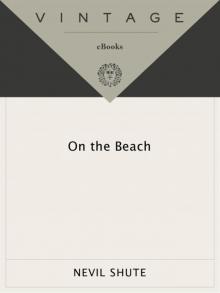 On the Beach
On the Beach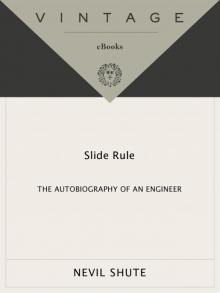 Slide Rule
Slide Rule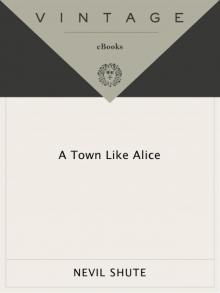 A Town Like Alice
A Town Like Alice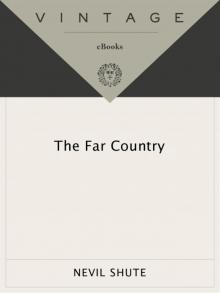 The Far Country
The Far Country Pied Piper
Pied Piper Round the Bend
Round the Bend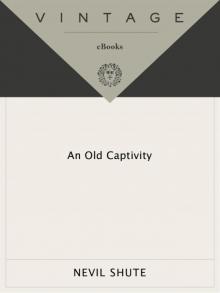 An Old Captivity
An Old Captivity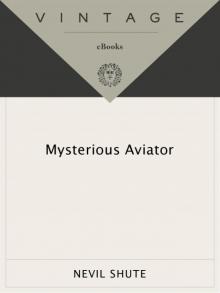 Mysterious Aviator
Mysterious Aviator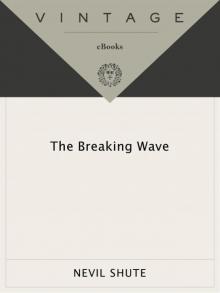 The Breaking Wave
The Breaking Wave Marazan
Marazan Lonely Road
Lonely Road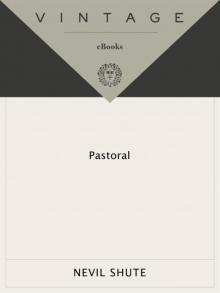 Pastoral
Pastoral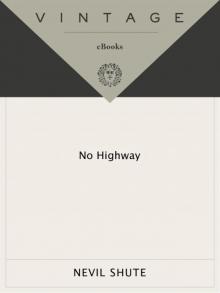 No Highway
No Highway Stephen Morris and Pilotage
Stephen Morris and Pilotage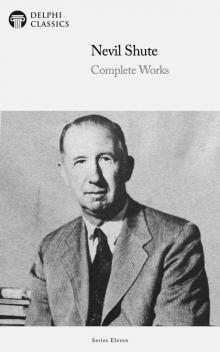 Complete Works of Nevil Shute
Complete Works of Nevil Shute Most Secret
Most Secret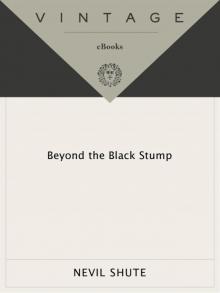 Beyond the Black Stump
Beyond the Black Stump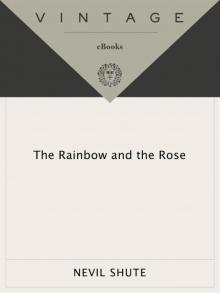 The Rainbow and the Rose
The Rainbow and the Rose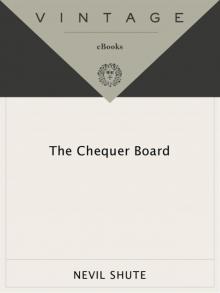 The Chequer Board
The Chequer Board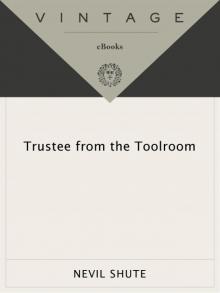 Trustee From the Toolroom
Trustee From the Toolroom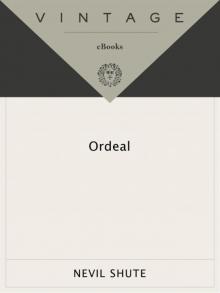 Ordeal
Ordeal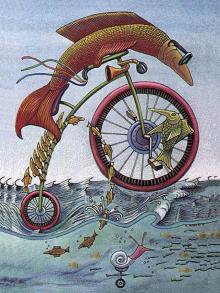 Stephen Morris
Stephen Morris